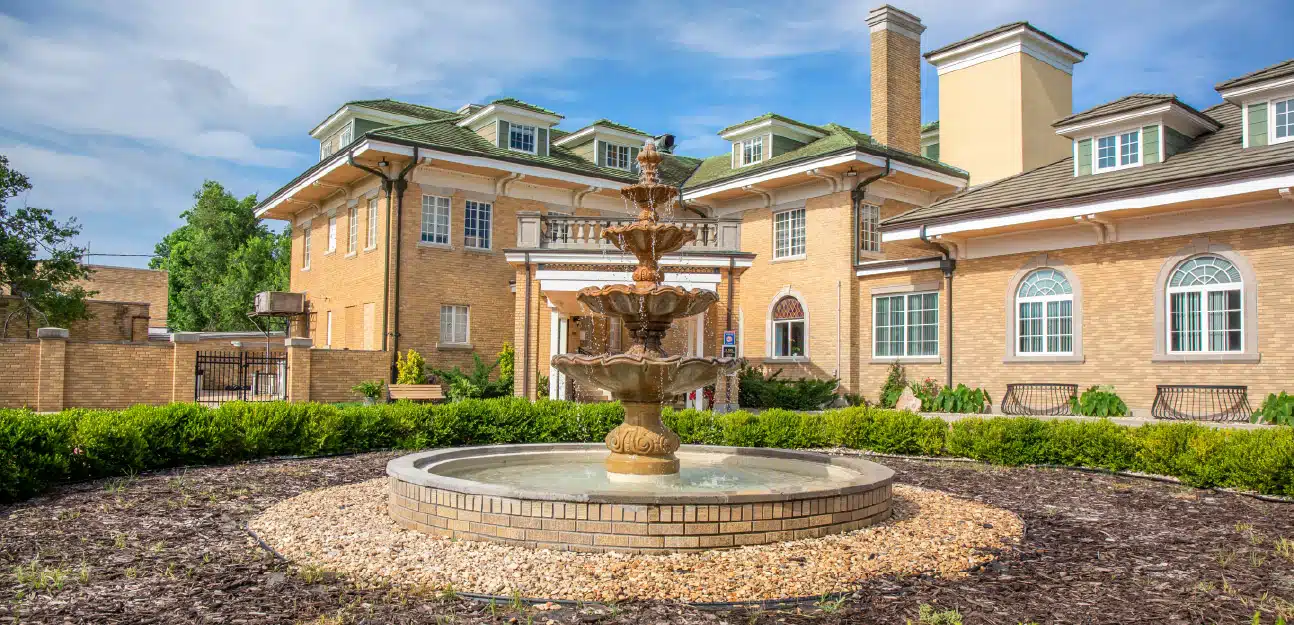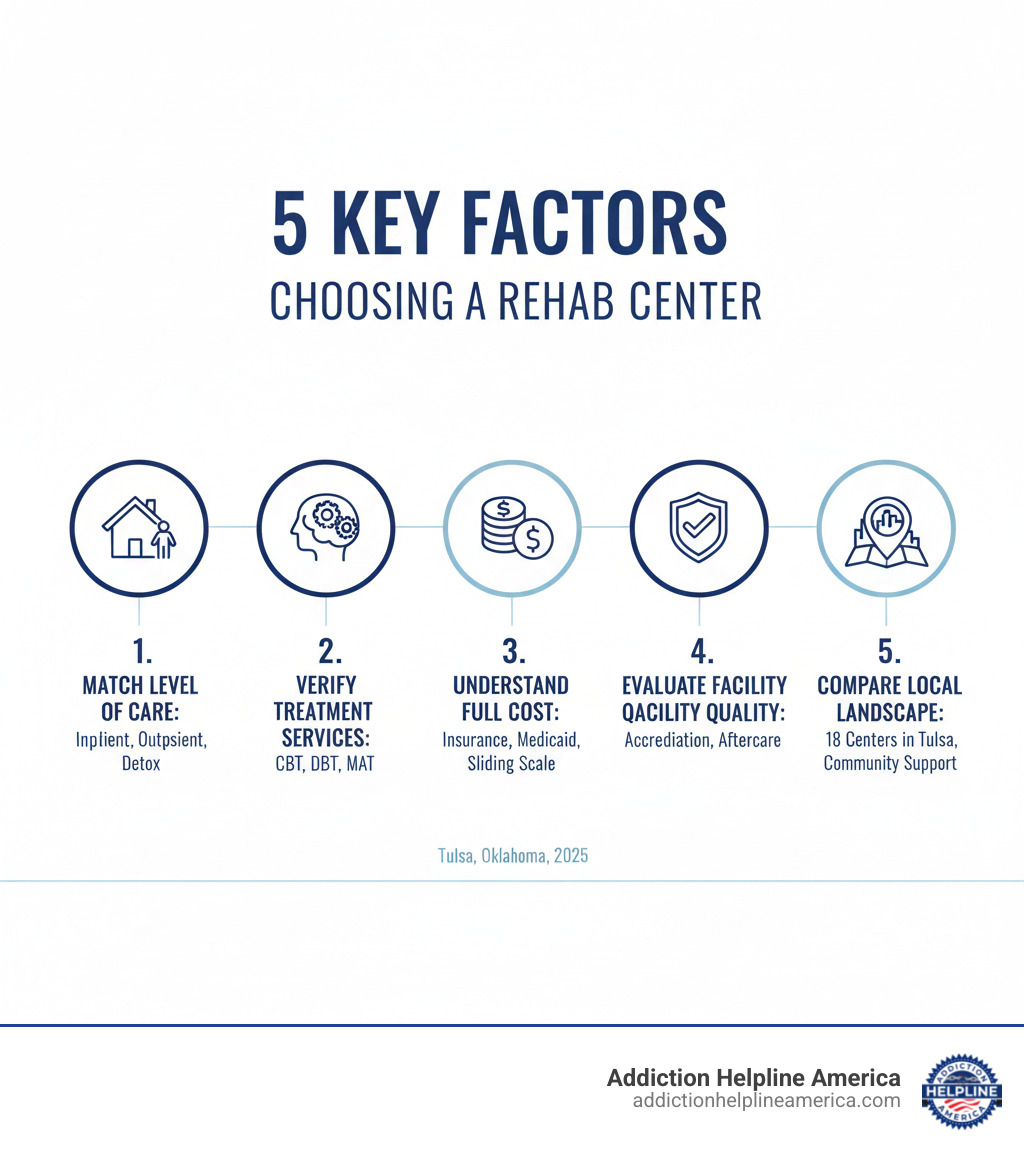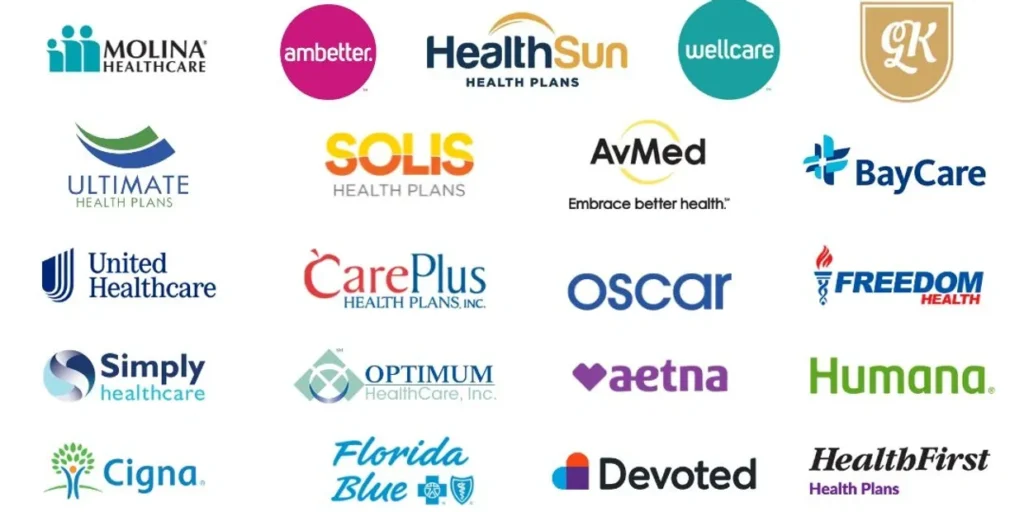
Finding the Right Path to Recovery in Tulsa
When addiction takes hold, finding help can feel overwhelming. You’re not just looking for any treatment center—you’re looking for the right one. The good news is that rehab centers in tulsa ok offer a wide range of addiction treatment options. The city has 18 rehab centers, including 4 inpatient facilities, 17 outpatient centers, and 8 detox centers.
Choosing the right facility can mean the difference between relapse and lasting recovery. The best rehab is the one that meets your specific needs, not the most expensive or advertised. It must align with your condition, circumstances, and recovery goals. Costs can range from around $4,164 for outpatient to $16,947 for residential care, with payment options like private insurance, Medicaid, and financial aid available.
At Addiction Helpline America, we guide individuals and families through finding appropriate rehab centers in tulsa ok. Our experience shows that informed decisions lead to better outcomes. This guide will help you evaluate your options with confidence.

Learn more about rehab centers in tulsa ok:
1. Match the Level of Care to Your Personal Needs
Finding the right rehab centers in tulsa ok starts with an honest assessment of your needs. Addiction doesn’t look the same for everyone, so the level of care that works for one person might be too much or too little for another.
Signs that you may need help include using more than intended, being unable to stop, neglecting responsibilities, and experiencing withdrawal symptoms. If consequences like legal or health problems pile up but substance use continues, it’s a clear sign that something needs to change.
A professional evaluation is the best next step. A trained clinician can assess your situation, identify any co-occurring mental health issues, and recommend the appropriate level of care. The National Institute on Drug Abuse confirms that effective treatment must be customized to an individual’s changing needs.
Finding the Right Level of Care at Rehab Centers in Tulsa, OK
Tulsa offers a full spectrum of treatment options to fit your situation.
Inpatient treatment (residential) provides 24/7 care in a structured environment. Tulsa has 4 inpatient drug and alcohol rehab centers where you live on-site, removed from daily triggers. This is ideal for severe addiction, an unsafe home environment, or if you need medical monitoring.
Outpatient treatment offers flexibility. Tulsa has 17 outpatient rehab centers where you attend treatment sessions but return home. This works well if you’re maintaining a job or have a strong support system. Options range from Intensive Outpatient Programs (IOP), with several hours of therapy per week, to Partial Hospitalization Programs (PHP), which offer full-day programming.
Medical detox is often the first step, especially for alcohol, benzodiazepine, or opioid use. Withdrawal can be dangerous, and Tulsa’s 8 detox centers provide medically supervised withdrawal management to keep you safe and comfortable.
Considering Specialized Programs
Addiction often co-exists with other issues, requiring specialized care.
Dual diagnosis treatment addresses both addiction and mental health conditions like depression, anxiety, or PTSD simultaneously. Many rehab centers in tulsa ok offer this integrated care.
Gender-specific programs create safer spaces for sharing. Tulsa offers programs designed for men and women, addressing gender-specific issues directly.
Adolescent programs use specialized approaches for young people dealing with unique developmental and social challenges, often including family therapy.
Veteran support is available through the Eastern Oklahoma VA Health Care System and Tulsa VA Outpatient Clinic, providing care that understands combat trauma and service-related stress.
Call Now – Your Journey to Recovery Begins Today!

Take the first step towards a healthier life! Call now to connect with our compassionate team and start your recovery journey today. Your path to healing awaits!
Our recovery specialists are available 24/7 to provide support, and all calls are confidential and free. Reach out anytime – we’re here to help!
2. Verify the Treatment Services and Therapeutic Methods
Once you know the level of care you need, look at what actually happens inside rehab centers in tulsa ok. Effective treatment combines evidence-based therapies, compassionate support, and often holistic approaches to treat the whole person.

Counseling and support groups form the backbone of recovery, helping you understand your addiction and develop new coping skills in a supportive community.
Core Therapies and Counseling
Ask potential centers about their therapeutic methods. The best programs use research-backed approaches:
Cognitive Behavioral Therapy (CBT) helps you recognize and change negative thought patterns that lead to substance use.
Dialectical Behavior Therapy (DBT) teaches skills for managing intense emotions and improving relationships, which is useful for those with trauma. Evolve Teen Depression Residential Treatment is one facility that uses DBT.
Individual and group therapy provide both private, one-on-one support and the shared understanding of a peer group. Family therapy, offered at centers like Great Plains Recovery and Valley Hope, helps repair relationships and build a supportive home environment.
Support groups like Alcoholics Anonymous (AA), Narcotics Anonymous (NA), and the science-based SMART Recovery provide vital, ongoing community connection. Local resources like Oxford House and the ARCO Recovery Community Organization also offer accountability and support.
Medical and Holistic Services
Modern treatment blends traditional therapy with medical and holistic care.
Medication-Assisted Treatment (MAT) combines FDA-approved medications (like Suboxone or Vivitrol) with counseling to treat opioid addiction. It reduces cravings and withdrawal, improving success rates. Facilities like Tulsa Comprehensive Treatment Center and GRAND Mental Health offer MAT.
Mental health services are crucial, as addiction and mental health issues often co-occur. Quality programs assess and treat conditions like depression or anxiety simultaneously.
Trauma-informed care, offered at centers like Synergy Recovery Center and Arcadia Trails, creates a safe environment to process past trauma without re-traumatization.
Holistic approaches like yoga, meditation, or art therapy can also be part of a treatment plan, offering alternative coping strategies and improving overall well-being.
Addiction Helpline America can help you find a center with the right mix of services for your unique situation.
3. Understand the Full Cost and Your Payment Options
Cost should never be the only barrier to recovery. Understanding the full cost and your payment options is an essential step in finding the right rehab centers in tulsa ok.

At Addiction Helpline America, we help people steer these financial waters every day.
Average Cost of Treatment in Tulsa
Costs vary by care level and duration. Here are some average costs in Tulsa for treatment without insurance:
- Residential Treatment: Approximately $16,947 for a 3.25-month stay (about $5,214/month).
- Intensive Outpatient (IOP): An average of $7,336 for a 3-month program (about $2,445/month).
- Standard Outpatient: Averages $4,164 for a 4.5-month period (about $925/month).
- Methadone Maintenance: Averages $14,950 for a nearly two-year program (about $687/month).
Specific facility costs can vary. Some outpatient detox programs may be around $1,200, while luxury facilities can exceed $10,000.
Exploring Payment Options for Rehab Centers in Tulsa, OK
You have more payment options than you might think. There is almost always a path forward.
Private Insurance: The Mental Health Parity and Addiction Equity Act requires most plans to cover addiction treatment. Most Tulsa rehabs accept major plans like Aetna, Blue Cross Blue Shield, Cigna, and UnitedHealthcare. We can help you verify your benefits.
Medicaid and Medicare: These government-funded programs make care accessible for individuals with lower incomes, disabilities, or seniors. Many Tulsa facilities accept both.
State-Financed Insurance: Oklahoma provides state-funded plans that offer another avenue for coverage.
Sliding Scale Fees: Some facilities adjust costs based on your income and ability to pay.
Financial Aid: Many centers offer scholarships, grants, or payment assistance. For example, The Salvation Army and The HOW Foundation offer no-cost residential programs. Always ask about financial aid.
Employer Assistance Program (EAP): Your employer may offer confidential support or referrals for substance use treatment.
Self-Pay: Paying with cash is an option, and some facilities offer discounts for upfront payment.
Don’t let financial concerns stop you. Free and low-cost options are available, and we can help you find a solution that fits.
4. Evaluate the Facility’s Quality and Long-Term Support
Finding the right treatment center isn’t just about the next 30-90 days; it’s about setting yourself up for a lifetime of recovery. Evaluating a facility’s quality and commitment to long-term support is critical.
Accreditations and Staff Credentials
Accreditation is a reliable sign of quality. Look for seals of approval from respected organizations:
- The Joint Commission and CARF (Commission on Accreditation of Rehabilitation Facilities) are top-tier accreditors for healthcare and rehabilitation services.
- Alignment with SAMHSA (Substance Abuse and Mental Health Services Administration) guidelines and membership in the National Association of Addiction Treatment Providers (NAATP) also indicate a commitment to ethical, evidence-based care.
Beyond accreditation, evaluate the staff. A strong clinical team includes licensed doctors, therapists, and counselors with expertise in addiction and co-occurring disorders. Some centers, like Capstone Treatment Center, highlight an excellent client-to-therapist ratio, ensuring personalized attention.
Ask about the facility’s treatment philosophy. The best rehab centers in tulsa ok develop individualized treatment plans that adapt to your unique needs and goals.
Aftercare and Sober Living Support
Recovery doesn’t end when a program is completed. What happens after treatment often determines long-term success. Look for robust aftercare support.

Continuing Care: Programs like those at Valley Hope provide ongoing support through step-down services or regular check-ins as you transition back to daily life.
Alumni and Peer Support: Alumni networks and peer support groups (like AA, NA, or SMART Recovery) provide invaluable connection and accountability with people who understand the journey.
Sober Living Homes: These structured, substance-free environments offer a supportive bridge between residential treatment and independent living. They emphasize peer support and gradual reintegration. For more information, see our sober living tulsa guide.
When evaluating rehab centers in tulsa ok, ask how they help with relapse prevention and long-term support. A facility’s commitment to your journey after you leave shows they are invested in your lasting well-being. At Addiction Helpline America, we know a strong aftercare plan is essential for successful recovery.
Call Now – Your Journey to Recovery Begins Today!

Take the first step towards a healthier life! Call now to connect with our compassionate team and start your recovery journey today. Your path to healing awaits!
Our recovery specialists are available 24/7 to provide support, and all calls are confidential and free. Reach out anytime – we’re here to help!
5. Compare the Landscape of Rehab Centers in Tulsa, OK
Understanding the full landscape of what’s available in Tulsa helps you make an informed choice. The city offers a robust network of options, so you can find a place that fits your life and needs.
Tulsa’s Addiction Treatment Environment
Tulsa has a strong foundation of treatment resources. With 18 rehab centers, including 4 residential facilities, 17 outpatient centers, and 8 detox centers, there is a program to fit every stage of the recovery journey.
Here’s a comparison of the main types of care in Tulsa:
| Level of Care | Number of Facilities in Tulsa | Typical Services | Best For Whom |
|---|---|---|---|
| Inpatient Treatment | 4 (Residential) | 24/7 medical supervision, structured daily schedule, individual and group therapy, safe environment away from triggers | Severe addiction, co-occurring mental health issues, unstable living situations, need for medical monitoring |
| Outpatient Treatment | 17 (Outpatient, IOP, PHP) | Flexible scheduling, individual and group counseling, education, family involvement, allows you to live at home | Mild to moderate addiction, strong home support system, work/school/family responsibilities, step-down from inpatient |
| Detox/Withdrawal Management | 8 (Detox) | Medically supervised withdrawal, 24/7 monitoring, medication management, safety and comfort focus | Physical dependence on substances, dangerous withdrawal symptoms (alcohol, opioids, benzodiazepines), first step in recovery |
This variety is critical. In 2019, Tulsa County had the seventh-highest overdose hospitalization rate in the country. This reality makes the work of rehab centers in tulsa ok absolutely vital. Many centers, like GRAND Mental Health, use a community-integrated approach, partnering with schools and police to create a true safety net and even bringing services to people with mobile programs.
Local Support and Community Resources
Recovery doesn’t happen in a vacuum. Tulsa offers a rich network of community support:
- 211 Oklahoma and the SAMHSA National Helpline (1-800-662-HELP) provide free, confidential referrals to local services.
- NAMI Oklahoma and the Mental Health Association Oklahoma offer advocacy, support groups, and resources for individuals and families.
- The Oklahoma Department of Mental Health and Substance Abuse Services (ODMHSAS) oversees public services and provides a comprehensive provider directory.
Progressive state laws also support recovery. Mental Health Parity Laws ensure fair insurance coverage, while the Good Samaritan Overdose Prevention Law protects those who call 911 for an overdose. This combination of treatment centers, community support, and protective laws creates a comprehensive environment for recovery in Tulsa.
Frequently Asked Questions about Tulsa Rehab Centers
How long does rehab in Tulsa usually take?
The duration of treatment at rehab centers in tulsa ok is based on your specific needs, not a fixed timeline. However, there are general guidelines:
- Inpatient/residential programs typically last 30 to 90 days, though longer stays may be necessary for severe addiction or co-occurring disorders.
- Outpatient programs (IOP/PHP) usually run for 3 to 6 months, offering flexibility while you manage daily life.
Crucially, your stay should be clinically determined, meaning it’s based on your progress. Recovery is an ongoing process, and aftercare through support groups or therapy often continues for months or years.
Can I lose my job for going to rehab?
No, you cannot be fired simply for seeking addiction treatment. Federal laws protect your employment.
- The Americans with Disabilities Act (ADA) protects individuals in recovery from workplace discrimination.
- The Family and Medical Leave Act (FMLA) allows eligible employees to take up to 12 weeks of unpaid, job-protected leave for treatment.
- HIPAA laws ensure your treatment remains confidential.
While you likely can’t work during residential treatment to maintain focus on recovery, your job is protected.
What should I look for in reviews for a Tulsa rehab?
When reading reviews for rehab centers in tulsa ok, look for patterns rather than single opinions. Focus on these key themes:
- Staff Compassion and Professionalism: Look for comments about a knowledgeable, patient, and respectful staff.
- Cleanliness and Environment: A clean, safe, and comfortable space is crucial for healing.
- Effectiveness of Therapy: Reviews should mention learning practical coping skills and feeling that the program was effective.
- Aftercare Support: Positive reviews often mention help with relapse prevention planning and connection to long-term resources.
- Personalized Care: Look for mentions of individualized treatment plans and feeling seen as a person, not just a number.
Ignore extreme outliers and use reviews as one tool in your decision-making process. The goal is to find the right fit for you, and Addiction Helpline America can help you sort through the information to make a confident choice.
Call Now – Your Journey to Recovery Begins Today!

Take the first step towards a healthier life! Call now to connect with our compassionate team and start your recovery journey today. Your path to healing awaits!
Our recovery specialists are available 24/7 to provide support, and all calls are confidential and free. Reach out anytime – we’re here to help!
Conclusion
Choosing among rehab centers in tulsa ok is a manageable process when you break it down. By matching care to your needs, verifying services, understanding costs, evaluating quality, and comparing the local landscape, you can move from confusion to clarity.
This decision is a choice for hope and a future where recovery is an achievable reality. The journey has challenges, but with the right support, lasting change happens every day. Tulsa’s network of detox, residential, and outpatient programs means there is a place for everyone ready to take that step.
At Addiction Helpline America, we know this first step can be hard. That’s why we’re here. We offer free, confidential guidance to connect you with the right program from our vast network. You don’t have to do this alone.
We’re here when you’re ready to find the support and hope you deserve.
Find the right Tulsa medical rehab for you
Our helpline is 100%
free & confidential
If you or someone you care about is struggling with drug or alcohol addiction, we can help you explore your recovery options. Don’t face this challenge alone—seek support from us.
Programs
Resources
Will my insurance
cover addiction
treatment?
We're ready to help
Find the best
drug or alcohol treatment
center
Are you or a loved one struggling with addiction? Call today to speak to a treatment expert.















